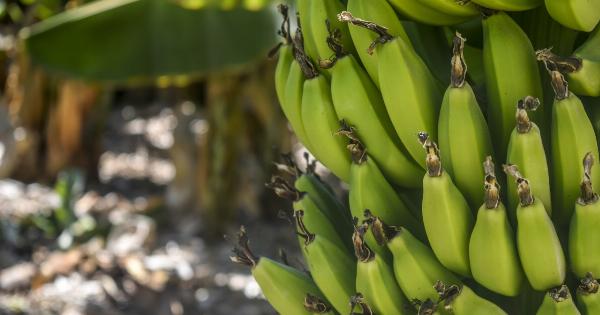Bananas are one of the most commonly consumed fruits all over the world due to their delicious taste, versatility and numerous health benefits.
In fact, bananas are a great source of fiber, potassium, vitamin C and vitamin B6, making them a healthy addition to any diet. However, eating unripe bananas can pose several risks to your health. In this article, we will explore why eating unripe bananas could be bad for your health.
What Are Unripe Bananas?
Unripe bananas are bananas that have not fully matured or ripened. They are typically green or yellow in color with green tips, and can be somewhat hard and starchy to the touch.
When bananas mature and become more ripe, they become sweeter, softer, and more yellow in color.
Bitter Taste
If you’ve ever tried eating an unripe banana before, you’ve likely noticed that they don’t taste very good. They have a bitter and astringent taste, which can be difficult for some people to enjoy.
This is because unripe bananas contain high levels of starch, which has not yet been converted into natural sugars.
Digestive Issues
Eating unripe bananas can also lead to digestive issues such as bloating, gas and constipation. This is because the high starch content in unripe bananas can be difficult for the body to digest, especially for those with sensitive digestive systems.
The high levels of resistant starch can also lead to the fermentation of undigested food in the colon, leading to problems such as gas and bloating.
Decreased Nutritional Value
In addition to the unpleasant taste and digestive issues, unripe bananas also have lower nutritional value compared to their ripe counterparts. As bananas ripen, their nutritional content changes.
For example, unripe bananas have higher levels of resistant starch, while ripe bananas have more natural sugars and antioxidants. This means that unripe bananas may not provide the same health benefits as ripe bananas, including aiding digestion, boosting immunity and regulating blood sugar levels.
Increased Levels of Toxicity
Another potential risk of eating unripe bananas is increased levels of toxicity. Unripe bananas contain high levels of tannins, which are a group of compounds that are known for their astringent and bitter taste.
In large amounts, tannins can be toxic and can cause several adverse health effects such as liver damage and reduced nutrient absorption.
Impact on Blood Sugar Levels
For people with diabetes or those trying to regulate their blood sugar levels, eating unripe bananas may not be the best option.
As previously mentioned, unripe bananas contain high levels of resistant starch, which has a slower impact on blood sugar levels compared to natural sugars found in ripe bananas. This means that unripe bananas can cause a gradual increase in blood sugar levels, leading to potential health risks for those with diabetes or other blood sugar issues.
Conclusion
In conclusion, while bananas are generally a healthy food choice, eating unripe bananas can pose several risks to your health.
From the unpleasant taste and digestive issues to decreased nutritional value and increased levels of toxicity, it’s important to choose ripe bananas instead. Ripe bananas provide the same health benefits, without the risks associated with unripe fruits. If you’re unsure whether a banana is ripe or not, look for bananas that are yellow with brown spots, or slightly green at the stem.






























